Modern Languages announces Chinese calligraphy contest winner, hosts reception April 21 in LLC
April 20, 2017
This April, the Department of Modern Languages celebrated the coming of spring by hosting a Chinese Calligraphy Contest. The event served as a way to showcase the beauty of the Chinese language.
Chinese calligraphy is regarded as a form of art, with multiple styles, developed over many centuries, all requiring skill and precision. That precision only comes with practice of brush handling and other elements of technique.
The calligraphy contest is a campus wide event, open to the entire college as well as Chinese class students. Professor Jessie Tsai of the Modern Languages Department said “Students in general like practicing Chinese calligraphy. They appreciate this unique art, enjoy gridding their own ink, and are happy to write characters with brushes.”
The judge for the contest is Dr. Hui-Ling Chen, director of institutional research. The winner will be announced Friday, April 21 in the LRC at 12:30 p.m., followed by a reception with Chinese food.
The event’s theme this year was “Spring,” which Professor Tsai said was incorporated into the contest. “Students got to choose a short phrase about spring to write,” she said. “Through the practice, students from Chinese classes also experience how to write characters differently both in pen and in brush.”
“I want to introduce students to this art and teach them how to write it. For my own students, writing Chinese calligraphy integrates their knowledge of the language and practicing a form of art.”
Student Laura Kalns, a participant in the contest, said “Chinese Calligraphy is an art form that uses a brush and ink to write characters. Each character must follow a certain pressure and stroke order. It’s a good way to relax and take your mind off your classwork, as it takes a lot of concentration to draw the characters correctly.”
The aim of the event is exposure to another culture in an interesting and entertaining way for students, most of whom would never have the opportunity.
Kalns said this worthwhile goal was met, and “The contest itself is a great way to get students at Saint Anselm College exposed to another culture while having fun.”
Professor Tsai was in agreement as to the success of the contest. “I am happy to say that this contest receives positive responses from the campus- even students who never learn Chinese want to participate.”



